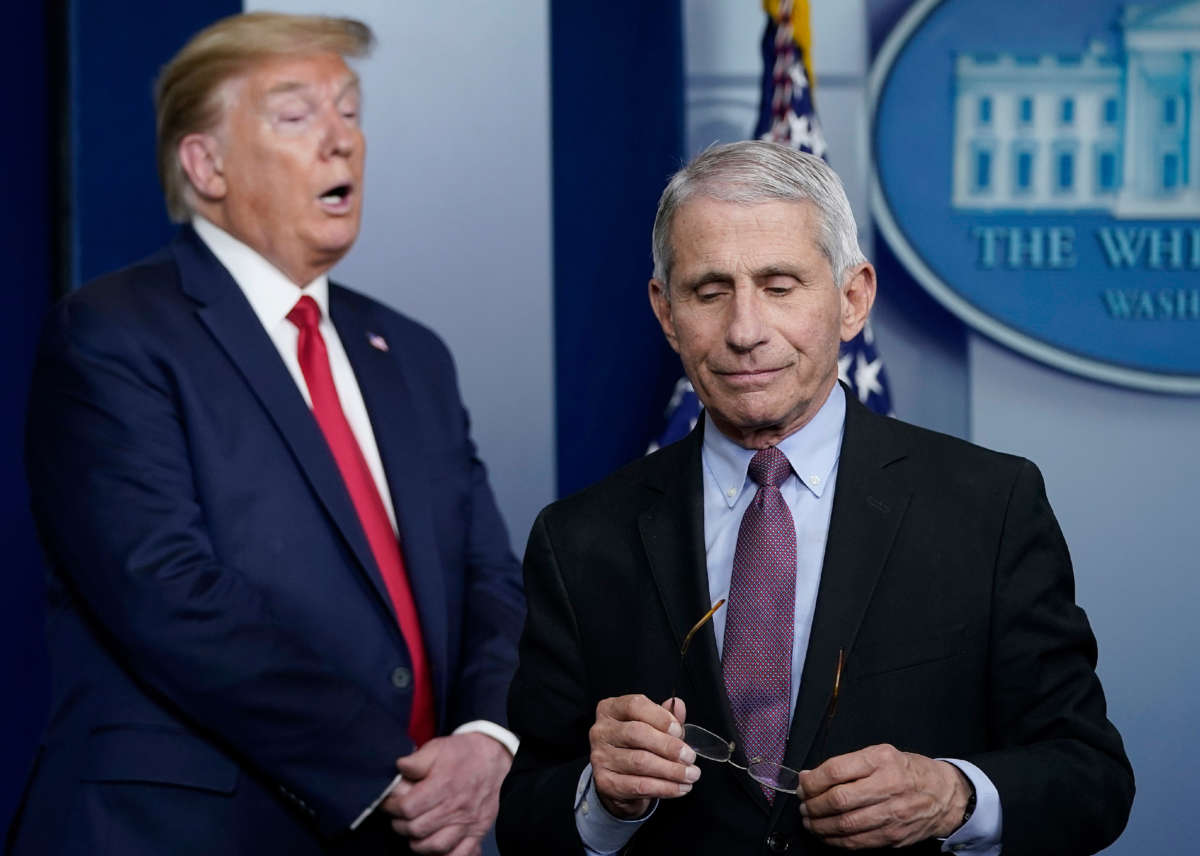Support justice-driven, accurate and transparent news — make a quick donation to Truthout today!
President Donald Trump denounced Dr. Anthony Fauci, the longtime director of the National Institute of Allergy and Infectious Diseases, as a “disaster” and possible “idiot” who “got it wrong” about COVID-19 — even though the president recently used Fauci’s words in a recent campaign commercial.
“People are tired of Covid,” Trump told reelection campaign staffers in a call on Monday, according to CNBC. The president claimed that people are “tired of hearing Fauci and all these idiots, all these idiots who got it wrong.” Trump accused Fauci of setting off a metaphorical “bomb” every time he makes a television appearance and claimed that he could not fire him. “There’s a bigger bomb if you fire him. This guy’s a disaster,” Trump said. He also used hyperbole to insult Fauci’s long government career, saying that the 79-year-old doctor has “been here for 500 years.”
Trump’s comments came after Fauci told “60 Minutes” on Sunday that he was not surprised when Trump contracted coronavirus, which causes COVID-19.
“I was worried that he was going to get sick when I saw him in a completely precarious situation of crowded, no separation between people, and almost nobody wearing a mask,” Fauci said. “When I saw that on TV, I said, ‘Oh my goodness. Nothing good can come outta that, that’s gotta be a problem.’ And then sure enough, it turned out to be a superspreader event.”
Fauci characterized Trump’s seeming distrust of science as part of a larger “anti-authority” streak in modern politics, but expressed mystification at the president’s refusal to wear a mask, telling correspondent Dr. Jon LaPook that “he sometimes equates wearing a mask with weakness,” seemingly in order to send a “statement of strength, like, we’re strong, we don’t need a mask, that kind of thing.”
Fauci is not the first expert to note the absurdity of Trump associating mask-wearing with weakness. Dr. Allan Lichtman, a political scientist at American University, told Salon in July that “there is nothing unmasculine about wearing a mask. It is not a show of weakness to wear a mask anymore than it is a show of weakness not to drive drunk.” He added that Trump was failing in his responsibilities as president by not wearing one, pointing out that “it’s a horrible message. It shows he doesn’t care about the health of his constituents. He cares more about his own image than he does about keeping the people around him safe.”
Although Trump also claimed that Fauci and his colleagues “got it wrong,” Trump was recorded telling journalist Bob Woodward in February that COVID-19 is “pretty deadly stuff” and in March that “I wanted to always play it down.” During that same period of time, Trump held large rallies in which the audience members were in close contact, and claimed the pandemic was a “Democratic hoax.” He ultimately waited more than ten weeks from the time the virus entered the United States before declaring a national emergency and has continued to not take steps proposed by health and economics experts to protect American lives and jobs.
Earlier this month Trump tried to defend his response to the novel coronavirus by quoting Fauci out of context in one of his campaign commercials. The 30-second advertisement included a clip of Fauci saying “I can’t imagine that anybody… could be doing more.” Fauci later clarified that he was referring to the White House Coronavirus Task Force, not Trump specifically, and added that “the way that ad went, where they quoted me at the end, it was certainly in the context that looked very much like a political endorsement, and I’ve assiduously avoided that for so many years, like decades.”
This is not the first time that there has been friction between Trump and Fauci. After the president blasted the World Health Organization (WHO) in June, claiming that “China has total control” over the group, Fauci told Rosemary Barton of the Canadian Broadcasting Corporation (CBC) that “the WHO is an imperfect organization. It certainly has made some missteps but it has also done a lot of good.”
He added, “I would hope that we could continue to benefit from what the WHO can do at the same time that they continue to improve themselves. I’ve had good relationships with the WHO and the world needs the WHO.”
Other conservatives have also attacked Fauci. Right-wing talk show host Rush Limbaugh, for instance, accused Fauci in April of being a “Clinton sympathizer” who wants to “get rid” of Trump.
“Can you believe these people don’t care about the economy being shut down? It is stunning to me. People are being ruined,” Limbaugh added.
Press freedom is under attack
As Trump cracks down on political speech, independent media is increasingly necessary.
Truthout produces reporting you won’t see in the mainstream: journalism from the frontlines of global conflict, interviews with grassroots movement leaders, high-quality legal analysis and more.
Our work is possible thanks to reader support. Help Truthout catalyze change and social justice — make a tax-deductible monthly or one-time donation today.
